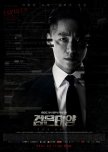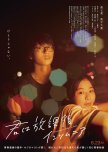
More Than a Rom-Com: A Deep Dive into Love and Life
*Love Next Door* is the kind of drama that sneaks up on you. You start expecting a light-hearted rom-com, ready to be charmed by the bickering "friends to lovers" trope, but what you get is a deep dive into complex family dynamics, existential questions, and a side of free therapy. 🎢 It's the type of show that gives you butterflies, a touch of annoyance, and maybe even a few "I need to rethink my life" moments. And, oh boy, did it deliver all of that and more.At first glance, it seems like a simple slice-of-life rom-com, but beneath that cozy exterior lies a drama packed with introspection and emotional weight. The story beautifully explores the scars of growing up neglected, feeling the pressure to succeed, and the awkward art of rebuilding relationships that never really took off. It asks questions like, "Can I ever be more than my parents' pride and joy?" and, "Why do dreams feel like luxuries for the privileged?" In other words, *Love Next Door* doesn’t just aim for your heartstrings—it goes straight for your soul. 💔
Now, let’s talk about the characters. On paper, Seung Hyo and Seok Ryu sound like your typical K-drama leads—she’s ambitious and independent, and he’s a little self-centered and emotionally closed-off. But the writers took it a step further by giving them real flaws that affected their relationships in ways that felt... too real. Seok Ryu’s fierce independence is admirable, but is it always a good thing? And Seung Hyo’s tendency to view everyone’s problems through how they affect *him*? Oh, we’ve all been guilty of that at some point. 🤨
Admittedly, Seok Ryu's journey was more fleshed out than Seung Hyo’s. It felt like *her* story, and while he was important, he wasn’t always the star of his own show. It's a common K-drama imbalance, but it didn't take away from the overall experience—it just made Seok Ryu's arc feel more impactful. Still, I wasn’t fully sold on their transition from friends to lovers. One minute they were bickering, the next they were in love, and I couldn’t help but think, “Wait, when did *that* happen?” But hey, maybe I blinked too long during a lip-biting scene. 😅💋
Speaking of lip-biting... Jung Hae In. Need I say more? If watching him swim, bite his lip, and navigate complicated emotions doesn’t get you hooked, I don’t know what will. His character may have been a bit whiny at times, but let’s be real—JHI could probably make even whining look charming. Meanwhile, Jung So Min was equally compelling, despite her character’s tendency to yell a bit too much for my taste. But in the end, her relatability and depth stole the show for me.
Now, let's throw some love to the supporting cast because they truly *made* this drama. The parents? Their stories were just as captivating as the main leads. In fact, I found myself more invested in their complicated relationships at times than I was in the main romance. The subtle friendship between the mothers? Chef’s kiss. 👩❤️👩 And Jo Han Chul’s portrayal of Bae Geun Sik? Well, let’s just say I cried when he cried and laughed when he laughed. That man deserves all the awards. 🏆
But hey, it wasn’t all sunshine and rainbows. The drunk scenes and occasional over-the-top yelling took up a bit too much screen time for my taste. And let’s not forget the friendship dubbed “lavender,” which was honestly a bit unbearable to watch. Thank goodness for the younger generation’s far more lovable and heartwarming friendships—they saved the day. 👏
In the end, *Love Next Door* is not just a rom-com. It’s a thoughtful exploration of relationships, family, and the messiness of life. It’s not about who’s right or wrong; it’s about combining different perspectives to see the bigger picture. It’s about privilege, setbacks, and fears—real issues that we all face. And even though it might occasionally frustrate you, it’ll also make you think, laugh, cry, and question your own assumptions about people and relationships.
Is it perfect? No. But it’s honest, it’s real, and it’ll leave you with enough emotions to fill a journal—or a long-winded review like this one. 😉
So, if you’re looking for something deeper than just a standard love story, give *Love Next Door* a try. Just make sure you’re ready for the feels. 💫
A shoutout to @kate and @Jojo for inspiring some ideas in writing this review! Your insights made the experience all the richer. Thank you! 🙌✨

If What You See or Do Is Really What You’re Seeing or Doing
𝐈𝐧𝐭𝐫𝐨𝐝𝐮𝐜𝐭𝐢𝐨𝐧:Some stories entertain you.
Some stories haunt you quietly.
Scent of Time does the latter.
I went into this drama thinking I knew exactly what I was getting another “villain gets a second chance” story, something in the same lane as Story of Kunning Palace. That familiarity is exactly why I didn’t even bother reading the synopsis. No warnings, no spoilers just the idea of a second chance, and that was enough. And honestly? Getting to watch both of these dramas in the same year felt unreal. Two brilliant stories. Two complex women. Two very different kinds of second chances.
But here’s where Scent of Time sets itself apart.
The difference lies in the hand of cards each female lead is dealt. Jiang Xue Ning in Story of Kunning Palace is sent back to a point early enough to truly alter her fate before marriage, before her sins harden into something permanent or many things.
Her future is difficult, yes, but still flexible. There is space to handle.
Hua Qian doesn’t get that mercy.
She wakes up only two years earlier on the night of a marriage she schemed her way into, when many of her family’s crimes are already in motion. The damage is half done. The wheels are already turning. No matter how desperately she tries to be better, there are limits to what repentance can undo. Her second chance is not freedom it’s restraint. And that makes all the difference.
What I expected was a familiar redemption arc.
What I got instead was a slow, aching meditation on regret, responsibility, self worth, and the unbearable truth that knowing better doesn’t always mean you can do better.
Scent of Time is not about fixing the past it’s about learning how to live with it. And somehow, I lived it with them.
This drama doesn’t rush to comfort you. It doesn’t hold your hand. It sits beside you quietly and asks: what if you could see all your mistakes clearly… yet still be powerless to undo them or escape them?
Watching Scent of Time felt less like binge watching and more like living inside Hua Qian’s heart like her fear, her resolve, her guilt, and her desperate desire to protect the people she loves. You don’t just observe her journey you carry it with her.
And I have to say this drama came to me as a recommendation, and no one warned me I’d be walking into this cast. Every main lead is visually striking, emotionally convincing, and good at what they do. Peng Chu Yue as Zhong Ye Lan and Zhang Yi Jie as Hua Rong Zhou were revelations for me, and yes I fell completely for Hua Rong Zhou. He deserves far more attention than he gets.
If you’re watching for the first time, keep an eye on the supporting cast too. Li Yun Rui as Wu Shuo Mo carries that quiet “future star” energy, and Ai Mi as Qian Zhi is effortlessly charming pretty, cute, and memorable.
Zhou Ye and Wang Xing Yue hold this drama together with grace and intensity. Looking back now, Scent of Time feels like the moment where their rise truly began. Since then, they’ve grown in every way acting, screen presence, and project choices and this drama stands as an early, powerful chapter in careers that are still unfolding beautifully.
Scent of Time doesn’t just tell a story, it invites you into one.
It lingers.
Like a scent you can’t quite name but can never forget.
𝐒𝐭𝐨𝐫𝐲:
At its core, Scent of Time tells the story of Hua Qian a woman who once lived as the villain everyone loved to hate. She schemed, manipulated, hurt others, and devoted her life to a love that was never truly hers. The cost was devastating: her family destroyed, her life lost, everything reduced to ashes.
Then comes the impossible mercy: a “second chance.”
Or so it seems.
Hua Qian wakes up two years earlier, on the night of her marriage not before her sins, but after many of them have already been set into motion. This is what makes the story cruelly honest. She is not given a clean slate. She must live with the aftermath of her past self’s choices while desperately trying not to create new ones.
She doesn’t seek power anymore. She doesn’t chase love. She wants only one thing: to protect her family.
And yet, the drama keeps whispering an uncomfortable truth some things cannot be undone. The dead do not return. Fate bends, but it does not break easily.
The story unfolds slowly, deliberately, forcing us to sit with moral ambiguity. Redemption here is not about becoming “good.” It’s about accountability, restraint, and learning when to let go.
And then comes the twist the revelation that this second life is not a second life at all, but a dream born from a coma, sustained by incense, memory, and longing. A fragile space where Hua Qian confronts herself, piece by piece.
𝐂𝐡𝐚𝐫𝐚𝐜𝐭𝐞𝐫𝐬:
What makes Scent of Time unforgettable is not plot twists, but people. Every character feels flawed, human, and painfully real.
𝙕𝙝𝙤𝙪 𝙔𝙚 𝙖𝙨 𝙃𝙪𝙖 𝙌𝙞𝙖𝙣:
She plays her not as a saint seeking redemption, but as a woman drowning in regret, trying to breathe without hurting anyone else. Hua Qian is sharp, composed, and quietly devastated. She doesn’t cry loudly. Her pain lives in her eyes, in her pauses, in the way she carries guilt like a second skin.
She loves fiercely especially her family and that love is both her salvation and her curse. She is not innocent, but she is sincere. Watching her feels like watching someone talk to their past self every day and choosing restraint instead of destruction.
Hua Qian isn’t rewritten as “good.” She is rewritten as aware.
𝙒𝙖𝙣𝙜 𝙓𝙞𝙣𝙜 𝙔𝙪𝙚 𝙖𝙨 𝙕𝙝𝙤𝙣𝙜 𝙓𝙞 𝙒𝙪:
Wang Xing Yue delivers something rare here: restrained intensity.
Zhong Xi Wu is not loud in his love. He watches. He waits. He carries devotion without demanding it in return. In the dream world, he is controlling, dangerous, shaped by Hua Qian’s fear of power and love. But in reality, he becomes the quiet constant the one who waits 26 months beside a comatose body, speaking softly to someone who may never wake.
His love isn’t perfect, but it is enduring.
What makes Zhong Xi Wu compelling is not romance, but patience. He does not ask Hua Qian to erase her past. He asks her to live.
𝙕𝙝𝙖𝙣𝙜 𝙔𝙞 𝙅𝙞𝙚 𝙖𝙨 𝙃𝙪𝙖 𝙍𝙤𝙣𝙜 𝙕𝙝𝙤𝙪:
Hua Rong Zhou is devotion made flesh. Fierce, loyal, reckless, and entirely hers, he loves Hua Qian without conditions or expectations. He’s the embodiment of protection, tenderness, and longing all at once.
But then the gut punch: he isn’t real.
Hua Rong Zhou is the version of Hua Qian that longed to be loved wholly, without judgment a mirror of her deepest desire for forgiveness. Losing him isn’t just losing a person, it’s losing a part of her soul, her innocence, her escape.
He’s not perfect he has flaws, missteps, limits but that only makes him achingly human. I love his character, and if anyone was meant for Hua Qian, it’s him. Saying goodbye breaks your heart because it’s a farewell to unconditional love, even if it was only ever a dream.
𝙋𝙚𝙣𝙜 𝘾𝙝𝙪 𝙔𝙪𝙚 𝙖𝙨 𝙕𝙝𝙤𝙣𝙜 𝙔𝙚 𝙇𝙖𝙣:
Zhong Ye Lan embodies a quiet, complicated kind of hypocrisy. He judges Hua Qian’s misdeeds while excusing Mu Yao’s, punishing betrayal selectively. His love is conditional, his morality flexible but he is never a caricatured villain. From his perspective, his feelings and judgments are earned, honest, and deeply human.
Scent of Time doesn’t let us look away from this discomfort: from Mu Yao’s point of view, Hua Qian would be unforgivable. And yet, Zhong Ye Lan forces us to sit with the truth that regret does not undo harm. He remains calm where others might act cruelly, seeking distance rather than revenge in Hua Qian’s second life. Even as he begins to see her differently, his feelings never fully escape the shadow of the past. Some emotions soften, but they cannot rewind time and in that quiet, measured restraint, he becomes one of the drama’s most painfully realistic and compelling characters.
𝙕𝙝𝙖𝙤 𝙌𝙞𝙣𝙜 𝙖𝙨 𝙈𝙪 𝙔𝙖𝙤:
Mu Yao is not evil she is pain made visible. Starting as a wronged, wounded soul, she gradually lets revenge consume her. The drama never excuses her actions, but it never paints her as a villain either. Watching her spiral is uncomfortable because she reflects Hua Qian’s own darkness from the first life a mirror showing how unchecked pain can twist the best of us.
And yet, Mu Yao finds her way back. She remembers who she truly is, rising from the shadow of hatred to reclaim herself. Her journey is a quiet testament: even when we become what we despise, redemption remains possible.
𝙇𝙞 𝙔𝙪𝙣 𝙍𝙪𝙞 𝙖𝙨 𝙒𝙪 𝙎𝙝𝙪𝙤 𝙈𝙤:
Li Yun Rui absolutely nailed it as Wu Shuo Mo such a deliciously wicked presence. Loved seeing him fully embrace the villain energy, it was oddly satisfying. Definitely hoping he takes on more roles like this in the future, because wow, he makes mischief look so good.
𝐇𝐮𝐚 𝐐𝐢𝐚𝐧 𝐚𝐧𝐝 𝐇𝐞𝐫 𝐋𝐨𝐯𝐞𝐬:
Hua Qian’s story is about love, regret, and growth. She begins with Zhong Ye Lan, the man she once obsessed over. In her first life, she did everything for him schemes, manipulations, even hurting others. But in the end, she lets go. She pushes him away, accepting that love cannot be forced. Watching her do this is heartbreaking but also beautiful. She grows, even through pain.
Then there’s Hua Rong Zhou, her devoted protector. His love is one sided but pure. He keeps her safe, understands her fears, and supports her without expecting anything in return. Slowly, Hua Qian begins to trust him and care for him in return. Their bond is quiet, tender, and so moving. I adore them they feel like everything you hope for in love: loyal, safe, and unconditional.
And finally, Zhong Xi Wu, the Lord. At first, he stays in the shadows, quietly watching her. But he loves her deeply and patiently, despite her mistakes and obsession with Zhong Ye Lan. He sacrifices, waits, and fights for her happiness. His love is selfless, unwavering, and heartbreaking in its intensity. Wang Xing Yue’s acting is incredible his eyes say everything. He deserves Hua Qian’s love, even more than she realizes at first.
The dream twist is clever: the Hua Rong Zhou in her dream is actually a reflection of Zhong Xi Wu. Her mind created him as someone to love and protect her unconditionally. The real ZXW has always been there, quietly loving her through everything. The ending shows her waking up, facing reality, and recognizing ZXW’s love. It’s painful but hopeful.
In her dream, the Lord became obsessive because her fears and insecurities influenced the dream. HRZ remained pure because he represented her safe space. This story is about learning that true love isn’t possession it’s patience, understanding, and sacrifice.
𝐇𝐮𝐚 𝐐𝐢𝐚𝐧’𝐬 𝐅𝐚𝐦𝐢𝐥𝐲:
Hua Qian’s family was such a whirlwind of emotions. At first, I couldn’t stand her father, but watching him redeem himself? Pure magic he grew into someone worthy of love and respect. Her brother and mother were this tangled mix of love and frustration, I had this love hate rollercoaster with them. And omg, her brother dying for Hua Qian didn’t see that coming at all. I thought I’d feel nothing, given all the terrible things he did, but seeing Hua Qian’s heartbreak made me ache too.
𝐇𝐮𝐚 𝐐𝐢𝐚𝐧 𝐚𝐧𝐝 𝐇𝐞𝐫 𝐁𝐨𝐧𝐝 𝐰𝐢𝐭𝐡 𝐇𝐞𝐫 𝐌𝐚𝐢𝐝𝐬:
Before the heartbreak, Hua Qian shared warmth and trust with her three maids, a quiet world of loyalty and care. Two betrayed her, shattering that fragile sanctuary, but Qian Zhi stayed steadfast, her devotion pure and unwavering until the very end.
Lol, it was kinda like Zhong Xi Wu’s two guards one calm and collected, the other a little chaotic but both bonded to him in their own way, just like the maids’ different ties to Qian.
𝐀 𝐇𝐞𝐚𝐫𝐭 𝐋𝐞𝐟𝐭 𝐢𝐧 𝐏𝐢𝐞𝐜𝐞𝐬:
Hua Qian’s journey broke me and healed me all at once she fought, loved, and sacrificed so fiercely for her family and for a life she barely dared to dream of, only to wake and realize it was all a fragile dream, yet in that dream she became stronger, wiser, braver, and even created a love that was hers alone in Hua Rongzhou, a pure reflection of her heart, while Zhong Xiwu waited patiently in reality, silently loving her enough to let her rise, fall, and choose her own path; I ache for her, I grieve with her, and I marvel at her courage, at her unshakable resilience, at the quiet beauty of a woman who suffered, survived, and, in the end, found herself.
𝐖𝐡𝐚𝐭 𝐖𝐞 𝐋𝐞𝐚𝐫𝐧:
This drama teaches that redemption is not about undoing the past, but about choosing differently now. That regret is not weakness. That love does not always arrive as romance sometimes it arrives as endurance.
Most importantly, it reminds us that running away, even into dreams, is still running.
𝐓𝐫𝐚𝐮𝐦𝐚 & 𝐋𝐨𝐯𝐞:
Scent of Time understands trauma deeply. Love here is not romanticized it is questioned, feared, reshaped. Loving someone does not mean saving them. Sometimes it means letting them wake up.
𝐄𝐧𝐝𝐢𝐧𝐠 𝐄𝐱𝐩𝐥𝐚𝐢𝐧𝐞𝐝:
The final episode shattered me. I truly believed Hua Qian was living her second life every quiet struggle, every fragile happiness with Hua Rong Zhou felt real. I let myself believe in it with her. And then the truth landed: it was all a dream.
I wanted to stay there. I wanted to pretend that world was real, because it was gentler, warmer, and forgiving in ways reality rarely is. But that’s the point. The dream was never meant to rewrite fate. It existed to give Hua Qian the courage to face herself.
Hua Rong Zhou was not real he was the love she needed to give herself. Pure, unwavering, without judgment. Zhong Xi Wu is the life she must return to: imperfect, painful, but real, and waiting.
The ending isn’t about who she chooses. It’s about choosing reality over illusion, even when illusion feels safer. Even when waking up hurts more than staying asleep.
Many people criticize this ending, but to me, it feels painfully honest. I know myself well enough to admit that if I were in her place, I would want to stay in the dream too. I would want to believe it was real and never come back. But life doesn’t let us hide forever. At some point, we have to wake up, face what we’ve done, what we’ve lost, and who we are becoming even knowing the cycle of pain may begin again.
That’s why this ending stays with me. It doesn’t comfort you. It tells the truth. And sometimes, that’s the bravest kind of storytelling.
𝐂𝐢𝐧𝐞𝐦𝐚𝐭𝐨𝐠𝐫𝐚𝐩𝐡𝐲 & 𝐎𝐒𝐓:
Scent of Time is hauntingly beautiful soft lighting, muted colors, lingering shots that make the world feel fragile. The scent motivates memory, truth, and illusion together.
The OST is delicate and emotional, wrapping the story around your heart. It doesn’t just show the story it is the story.
I love all Osts, and here is the full playlist: https://youtu.be/ki9VKEZd2Dk
𝐎𝐯𝐞𝐫𝐚𝐥𝐥 𝐈𝐦𝐩𝐫𝐞𝐬𝐬𝐢𝐨𝐧:
It was so, so good. I’m over the moon finishing this on the last days of December, feeling happy knowing these characters will move into 2026 with me.
Scent of Time isn’t perfect, but it is sincere. The story made me laugh, cry, ache, and think about choices, consequences, forgiveness, and love. Hua Qian is smart, strong, and unapologetically herself, a female lead you can root for. Zhong Xi Wu is patient, kind, and deeply devoted the kind of male lead who makes you believe in love without needing perfection. Hua Rong Zhou is the protector you wish you had, loyal and fearless, giving so much heart to the story.
This drama lingers, not because it comforts you, but because it respects your heart and intelligence. It’s clever, emotional, and unforgettable a hidden gem, a story about waking up, and a scent that stays long after the screen goes dark.
It’s a must watch if you want a heroine to admire, a love that feels real, and a story that stays with you, along with character development.

Stirring Souls: The Struggle Behind Every Dish
𝗙𝗶𝗿𝘀𝘁 𝗜𝗺𝗽𝗿𝗲𝘀𝘀𝗶𝗼𝗻𝘀:This year, I’ve found myself watching quite a few food dramas, from Tastefully Yours to Bon Appétit, Your Majesty (many more). Both were enjoyable in their own way, but they didn’t really stay with me. Then came La Grande Maison Tokyo, and suddenly I was reminded of the excitement I once felt watching Food Wars! anime, that feeling that food can be more than just nutrition; it can be art, passion, and even redemption.
For someone who doesn’t eat much in real life, I was surprised by how interested this drama made me, not just in food, but in dreams and determination too
𝗖𝗵𝗮𝗿𝗮𝗰𝘁𝗲𝗿𝘀: 𝗙𝗹𝗮𝘄𝗲𝗱, 𝗕𝗿𝗶𝗹𝗹𝗶𝗮𝗻𝘁, 𝗛𝘂𝗺𝗮𝗻:
At the heart of the story is Obana Natsuki (Takuya Kimura), once the pride of French cooking in Paris, now disgraced as the “Shame of Japan” after a diplomatic accident. Arrogant, obsessive, and hard to like, Obana is not the usual hero. And yet, it’s exactly his flaws that make his comeback so interesting. Watching him recover from rock bottom, one plate at a time, is both frustrating and inspiring.
Beside him stands Rinko Hayami (Kyoka Suzuki), a lively chef in her fifties who dreams of one day creating a three Michelin star restaurant. At first, she is full of doubts, unsure of her talent or place in such a competitive world. But through her persistence and her bond with the team, she grows, showing that determination is as important as skill. Her journey will connect with anyone who has ever doubted themselves, only to discover their strength by trying.
The supporting cast is a colorful mix of personalities:
Kyono Rikutaro (Sawamura Ikki): weighed down by debt and past betrayal, whose return to Obana’s side shows forgiveness and courage.
Hirako Shohei (Tamamori Yuta): young but layered, with enough presence to start his own spin-off (Gura Gura Maison Tokyo).
Chef Tango (Onoe Kikunosuke V): a rival chef whose story moves from morally unclear to surprisingly honest.
Linda Machiko Richard (Tominaga Ai): the lively Marie Claire Dining editor whose taste and decisions influence the story.
What stood out most is that no character is one-sided. Even rivals and enemies have believable reasons. Eto, the rival restaurant owner, is harsh, but his behavior comes from the tough survival rules of high-class cooking. This makes the drama feel real and believable.
𝗧𝗵𝗲𝗺𝗲𝘀 & 𝗛𝗲𝗮𝗿𝘁:
This series isn’t just about chasing Michelin stars, it’s about second chances, teamwork, and the courage to dream again.
Redemption: Obana’s journey from scandal to understanding shows that failure can either break us or reshape us.
Teamwork: Kitchens are like battlefields. Without trust, no dish, no matter how perfect, will ever shine.
Dreams: The phrase “Catch your own star” feels personal. Whether it’s food, art, or life, we all have a star worth chasing, even if the world thinks we can’t.
Watching Rinko’s growth especially gave me courage. Her story reminded me that doubt doesn’t have to define us and that belief in ourselves often comes from being supported by others.
𝗣𝗿𝗼𝗱𝘂𝗰𝘁𝗶𝗼𝗻 & 𝗖𝗿𝗮𝗳𝘁:
The production is, honestly, Michelin star quality itself:
Authenticity: Filmed at real Michelin starred places like L’Ambroisie in Paris and Quintessence in Tokyo, the series never feels fake. Working with real chefs makes every cooking scene amazing.
Cinematography: Each dish is like a painting, every angle makes you taste it with your eyes.
Music: Hideakira Kimura’s music, combined with Tatsuro Yamashita’s theme song RECIPE, adds elegance to every scene.
Obana returning to the stove after years away, carrying knives like a cranky Mary Poppins, was unforgettable.
The intense rivalries with Gaku restaurant added spice and souper levels of tension.
Friendships built over food showed that time really can heal old wounds.
And while romance slowly built in the background, the main love story was between the chefs and their craft.
𝗣𝗲𝗿𝘀𝗼𝗻𝗮𝗹 𝗥𝗲𝗳𝗹𝗲𝗰𝘁𝗶𝗼𝗻𝘀:
As someone who doesn’t eat much, I wasn’t expecting to be so emotionally moved by this show. The food was beautiful, yes, but the real nourishment came from the characters’ struggles and achievements.
It reminded me why I love food stories because food is memory, forgiveness, and connection. Watching the Grand Maison Tokyo team reminded me that success is never achieved alone; it is always a shared effort.
𝗙𝗶𝗻𝗮𝗹 𝗧𝗵𝗼𝘂𝗴𝗵𝘁𝘀:
La Grande Maison Tokyo is more than just a food drama. It’s an emotional symphony of passion, pride, and determination, served with both elegance and intensity. If Michelin rated TV shows, this one would be worth a special journey, if not a long journey.
Like a fine meal, it left me full, inspired, and quietly moved.

Story of Kunning Palace: A Dark, Slow-Burn Masterpiece of Redemption and Power
Introduction: A Long-Awaited Dive Into Darkness and DesireFor months, Story of Kunning Palace was bookmarked on my “must-watch” list like a shadow I couldn’t shake. I wanted to see how a story about power, regret, and second chances could unfold in a world dripping with palace politics and moral complexity. Finally, I gave it the time it deserved — and I was utterly consumed. 🔥
This isn’t just a drama; it’s a psychological exploration of ambition’s cost and the scars we carry when we try to rewrite the past. 🧠💔
"Sometimes the past isn’t just a story — it’s a shadow that won’t let go."
➡ The Heart of the Drama: Jiang Xue Ning’s Complex Redemption
"Power built on broken hearts is a throne no one can truly sit upon." 👑💔
Flawed but deeply captivating: Jiang Xue Ning isn’t your typical innocent heroine. She is full of contradictions — once selfish, cold, and cunning, now weighed down by the consequences of her past mistakes and haunted by the pain she caused. Her ambition built empires but also broke hearts, and now those broken pieces hurt her more than any weapon could.
Redemption marked by scars: Her second chance isn’t a fresh start but a tough and honest struggle. Inside herself, the ruthless schemer fights with the part of her that wants love, forgiveness, and real connection. She carries a heavy guilt that almost overwhelms her, but beneath that pain, there is a fragile hope — that even a damaged heart can learn to heal and become whole again.
Slow, painful, and meaningful growth: Ning’er’s journey is about slowly letting go of pride, regret, fear, and holding on to strong determination. Every step forward is a fight and sometimes she falls back because of who she is. It’s a powerful mix of light and darkness, inviting us to not only watch her change but to feel it to root for a woman desperate to change her fate, even as her past pulls her back into palace intrigue and betrayal.
➡ Xie Wei: The Troubled Mind Behind the Vengeful Mask
"Vengeance is the echo of a childhood left unspoken." 🖤⚔️
Xie Wei is full of contradictions — a man whose soul is both a battlefield and a fortress. What makes him so interesting:
A mind shaped by pain: Every careful plan and ruthless move comes from the wounds of abandonment and betrayal. His childhood scars are invisible but they guide every decision, making him a master strategist who trusts no one but himself.
Loyalty as strong as steel: Under his cold surface is a deep loyalty only shown to a few — especially Ning’er, the one person who stirs emotions inside him.
Feelings hidden away: Xie Wei covers his emotions with sarcasm and sharp words — a shield to protect a man scared of showing weakness.
"The darkest wounds shape the fiercest hearts — love is the only light strong enough to reach them."
Obsession as a way to save himself: His love for Ning’er isn’t just passion; it’s a desperate hope that even the darkest people can find salvation through connection.
A balance between control and chaos: Watching Xie Wei is like seeing a man fight to keep his inner chaos in check, with sudden bursts of rage and tenderness. He is as dangerous as he is broken, as cruel as he is lovable.
Zhang Ling He plays this complex character with great intensity, making Xie Wei a magnetic presence you can’t look away from, the ultimate bad boy with a soul longing to be understood.🎭✨
➡ The Men Around Her: Mirrors of Morality and Desire
Zhang Zhe — The Righteous Idealist:
"Integrity in a world of lies is both a shield and a lonely burden." ⚖️
Zhang Zhe stands firm on his principles, loyal and brave even when the odds are against him. Though sometimes underdeveloped, his steadfast morality contrasts sharply with the darker players, embodying tragic love lost and second chances. 💔
Wang Xing Yue captures his noble spirit perfectly, showing a man who fights for justice in a world built on deceit.
Yan Lin — The Loyal Warrior:
Zhou Jun Wei’s free-spirited general adds energy and heart. His fierce loyalty and sincerity make him a fan favorite, a true “green flag” in the tangled web of palace intrigue. 🔥
"Loyalty without limits burns brightest when the stakes are highest."
Each man reflects different facets of Ning’er’s psyche and emotional needs — security, admiration, and passionate connection. 🔄❤️
➡Palace Intrigues and Schemes: Tension That Hooks You
Well-crafted politics: The palace is a chessboard, and Ning’er and Xie Wei are master players — manipulating, betraying, and outsmarting foes with calculated ruthlessness. ♟️👑
Pacing and suspense: Twists come fast enough to keep you hooked without feeling overwhelming. Even if some villains are underwritten, the stakes feel real because of the leads’ compelling power play.
A dark, addictive atmosphere: The drama balances intense scheming with emotional vulnerability, creating a vibe that’s both thrilling and deeply human.
➡Romance That Simmers and Explodes
Slow burn done right: The romance isn’t rushed; it simmers with chemistry and tension before igniting into steamy, unforgettable moments. 💞
No petty love triangles: Each love interest has space to breathe and earn their place, avoiding clichéd misunderstandings. The emotional arcs feel earned and genuine.
Xie Wei & Ning’er — A Match Forged in Fire: Their connection is magnetic and raw — two broken souls who understand and challenge each other, making their love story one of the year’s most satisfying. ❤️🔥
➡The Supporting Cast & Relationships: More Than Just Background Noise
Rich, diverse characters: From loyal friends to scheming rivals, each supporting role adds texture and depth. Female friendships and alliances break the mold of typical palace dramas, bringing fresh dynamics to the story.
Emotional bonds: The drama invests in relationships beyond romance — friendships, family ties, and loyalty are portrayed with nuance and heart.
➡Production Notes: Strengths and Quirks
Acting: Bai Lu and Zhang Ling He deliver powerhouse performances that carry the drama’s emotional weight. Wang Xing Yue and Zhou Jun Wei also shine despite less screen time.
OST: The soundtrack is haunting and beautiful, perfectly matching the story’s tone and heightening key moments. 🎶
Costumes & Makeup: Solid and fitting, with subtle shifts reflecting character growth. Some critiques about overused filters and camera effects are fair, but don’t overshadow the storytelling.
Cinematography: Occasionally shaky with odd angles and excessive lighting, but it adds a raw energy that some viewers might find engaging.
➡Final Thoughts: Why You Should Watch
This drama is for those who see life in all its messy, beautiful complexity. It’s about second chances, deep regrets, and finding redemption amid ruthless ambition.
The characters are imperfect and real, and their slow-burning romance feels earned and meaningful. The palace politics aren’t just power plays—they’re emotional battles that pull you in.
You’ll root for a heroine rewriting her story and a hero who loves fiercely despite his scars. The ending balances justice with heart, leaving you thoughtful and satisfied.
If you want dark intrigue mixed with real emotion and sharp wit, Story of Kunning Palace should be at the top of your list.
"Broken porcelain can be mended with gold and become even more beautiful."

Strikingly beautiful romance
Introduction:This film is a true gem, one that’s challenging to discuss without revealing its most profound moments. It’s layered with intriguing paradoxes, much like the complexity of an old folk tale. Rather than attempting to untangle its narrative, it’s more fulfilling to marvel at its execution, which is nothing short of exceptional.
Presentation and Storytelling:
What makes this film shine is its extraordinary presentation, weaving together impeccable writing, direction, acting, and a touch of imagination. Every aspect is handled with such finesse that it evokes a wide range of emotions—from laughter to warmth and even tears. To capture this emotional spectrum within a single story is an incredible achievement that deserves applause.
Acting and Character Depth:
The cast delivers breathtaking performances, immersing themselves in their characters’ journeys. Their authenticity and emotional depth are mesmerizing, making the relationships portrayed on screen feel both tangible and heartfelt. The simplicity of the production, free from flashy effects or CGI, highlights the sheer strength of the performances and the narrative. This is a film that relies entirely on its actors, and they rise to the challenge, creating a deeply moving experience.
A Unique Narrative Twist:
One of the film’s standout features is its simultaneous climax and anticlimax—a rare storytelling device executed flawlessly here. This adds a layer of sophistication and intrigue to the narrative, leaving a lasting impression. It’s not often seen in cinema, but when done as effectively as it is here, it elevates the story to another level.
Conclusion:
In the end, this film stands out as a modern masterpiece of romantic storytelling. Its unconventional nature might not appeal to those who prefer dissecting every plot detail, but for anyone who cherishes heartfelt stories and beautifully crafted cinema, this is a must-watch. Its depth and emotional resonance make it a film worth revisiting—a true mark of excellence in storytelling.

"Secret Relationship": A Descent into the Abyss of Desire and Deception
Introduction: A World Shrouded in Shadows:"In a world where love is laced with control, can anyone truly break free from their past?"
"Secret Relationship" isn’t just another KBL series. It’s a haunting, twisted journey through the hearts and minds of characters caught in a web of passion, manipulation, and self-discovery. From the very first episode, you’re plunged into a world where every glance hides a secret and every touch carries an ulterior motive.
Jung Da-on: The Reluctant Protagonist:
Jung Da-on (played by Kim Jun-seo) is a man shaped by hardship. Raised in poverty, he has learned to navigate life with resilience and caution. His past is a delicate balance of family obligations and personal sacrifices, each one pulling him in different directions. The series offers glimpses into his strained family dynamics, especially his determination to support his sister’s education—a rare beacon of hope in his otherwise chaotic life. However, the show leaves you craving a deeper exploration of how his family’s hidden truths have shaped his psyche.
Shin Jae-min: The Puppet Master:
Shin Jae-min (portrayed by Kim Ho-young) enters Da-on’s life as a mentor, a guiding force during his darkest moments. But as the story unfolds, Jae-min’s true nature surfaces—his affection teeters on the edge of obsession. His control over Da-on is subtle yet insidious, weaving a web of guilt and dependence. The series masterfully captures Jae-min’s descent into madness, serving as a chilling reminder of the fine line between love and possession.
Joo Seong-hyeon: The Beacon in the Storm:
Amid the chaos, Joo Seong-hyeon (played by Cha Sun-hyung) stands as Da-on’s colleague—and possibly his salvation. Their relationship evolves from mere professional interaction into a complex bond layered with unspoken emotions. Seong-hyeon’s unwavering support provides Da-on with a sense of stability, a stark contrast to the turbulence that surrounds him. Their year-long separation becomes a testament to their resilience, each day apart a battle against the ghosts of their past.
Psychological Turmoil: The Thin Line Between Love and Obsession:
The series doesn’t just scratch the surface of its characters’ struggles—it plunges into the depths of their desires and fears. Da-on’s internal conflict is raw and palpable, torn between the lingering ties of his past and the growing connection with Seong-hyeon. The manipulation he endures isn’t just physical but deeply psychological and emotional, leaving scars that run deep. These toxic dynamics serve as a stark reminder of the darkness that can lurk within human relationships.
"No one can escape their past. The sins we've committed... and the sadness we've caused... No matter how far we run, our past remains, as ever-present as the moon in the sky."
Visual Aesthetics: A Canvas of Despair and Desire:
Visually, Secret Relationship is stunning. The cinematography employs a muted color palette, with shadows and contrasts that reflect the characters’ inner turmoil. The lighting masterfully shifts between the cold, clinical tones of manipulation and the warm, intimate hues of genuine affection. Every frame is meticulously crafted, pulling you deeper into the emotional core of the narrative.
Unanswered Questions: The Allure of the Unseen:
While the series delivers compelling character studies, certain elements remain tantalizingly unexplored. The full extent of Da-on’s family’s influence on his psyche is left shrouded in mystery, their backstory merely hinted at. This deliberate ambiguity adds a layer of intrigue, inviting viewers to piece together the puzzle on their own.
Conclusion: A Symphony of Shadows:
Secret Relationship isn’t for the faint of heart. It’s a raw, unfiltered look at the complexities of human relationships, where love and obsession intertwine in a dance as old as time. The characters are deeply flawed, their motivations murky, yet it’s this very complexity that makes them so compelling. As the series draws to a close, it leaves you with more questions than answers, a lingering sense of unease, and a profound appreciation for the dark beauty of human nature.
~Inspired from Jojo

"Guardians of Dafeng": A Masterpiece of Chaos, Justice, and Unforgettable Characters
If you’re looking for a drama that will make you laugh, cry, scream, and cheer—all while keeping you on the edge of your seat—then Guardians of Dafeng is your next must-watch. This isn’t just another historical Wuxia drama; it’s a rollercoaster of emotions, packed with humor, heart, and jaw-dropping twists. Let me break it down for you, because this show deserves ALL the hype.1. A Story That Keeps You Hooked: "What in the Dafeng?!"
From the very first episode, Guardians of Dafeng grabs you and doesn’t let go. The plot follows Xu Qi An, a modern-day office worker who gets transported into the Dafeng Dynasty, where he uses his wit, intelligence, and modern knowledge to solve mysteries and fight for justice. But don’t let the “transmigration” trope fool you—this isn’t your typical time-travel story.
The narrative is a perfect blend of humor, suspense, and action. Just when you think you’ve figured it all out, the drama throws in a curveball that leaves you gasping. The pacing is impeccable, with each episode building on the last, leading to a finale that’s equal parts satisfying and heart-wrenching. And let’s not forget the cliffhanger ending—complete with a post-credits scene that will have you begging for Season 2.
2. Xu Qi An: The Chaotic Hero We All Need
Dylan Wang as Xu Qi An is a revelation. If you thought he was great in Love Between Fairy and Devil, just wait until you see him here. Xu Qi An is sharp, resourceful, and hilariously chaotic. His comedic timing is flawless, but it’s his emotional depth that truly shines. Whether he’s cracking jokes or delivering a fiery speech about justice, Dylan brings so much authenticity to the role.
One of the most gripping moments is when Xu Qi An confronts the corruption in Chuzhou. The raw emotion he displays—grief, rage, and an unyielding sense of justice—is nothing short of breathtaking. You’ll find yourself cheering for him, crying with him, and maybe even screaming at your screen (I know I did).
3. A Cast of Characters You’ll Fall in Love With
The supporting cast is just as phenomenal. From Xu Qi An’s hilariously chaotic family to the loyal Guardians (affectionately dubbed the “Scooby gang”), every character feels real and relatable.
Lord Wei: The surrogate father figure who balances wisdom with a dry sense of humor. His bond with Xu Qi An is one of the most touching aspects of the show.
Princess Lin’an: While the romance subplot isn’t the main focus, her chemistry with Xu Qi An is sweet and organic. Plus, her character growth is a joy to watch.
The Xu Family: They’re loud, dramatic, and utterly endearing. Their love for Xu Qi An is both hilarious and heartwarming.
Even the antagonists are layered and compelling. The “dark robe dude” (Xu Qi An’s biological father) is a villain you’ll love to hate, and his complex motivations add depth to the story.
4. Themes That Hit Hard: Justice, Loyalty, and Sacrifice
At its core, Guardians of Dafeng is a story about standing up for what’s right, even when the odds are stacked against you. It doesn’t shy away from the harsh realities of power and corruption, but it also celebrates the quiet bravery of ordinary people.
The sacrifices made by characters like Mr. Zheng are genuinely heart-wrenching, and the show’s exploration of loyalty and camaraderie is deeply moving. As Xu Qi An says, “You’re paid as a court official, you live off the people's resources, but you can’t fool the heavens.” These moments of moral clarity are what make the drama so impactful.
5. Stunning Visuals and Production Quality
The cinematography is breathtaking. From the bustling streets of the capital to the serene mountain landscapes, every scene feels like a painting come to life. The costumes and sets are meticulously detailed, adding to the immersive experience.
And let’s talk about the CGI—it’s some of the best I’ve seen in recent dramas. The fight scenes are beautifully choreographed, blending magic and martial arts in a way that feels fresh and exciting. Plus, the opening rap song is a bold and refreshing choice that perfectly sets the tone for the series.
6. Humor That Hits the Mark
One of the standout features of Guardians of Dafeng is its humor. The comedy never feels forced or out of place. Whether it’s Xu Qi An’s witty one-liners, the Xu family’s over-the-top antics, or the Guardians’ bumbling misadventures, the laughs come naturally.
But what’s even more impressive is how the show balances humor with emotional depth. One moment you’re laughing at Xu Qi An’s zombie impersonation, and the next you’re tearing up over a heartfelt sacrifice. It’s this perfect blend of light and dark that makes the drama so compelling.
7. The Ending: A Cliffhanger That Leaves You Wanting More
Without giving too much away, the finale is a masterclass in storytelling. It ties up loose ends while leaving just enough unanswered questions to keep you hooked for Season 2. The emotional weight of the final episodes—especially the heart-wrenching memory loss twist—will leave you reeling.
And that post-credits scene? Pure genius. It’s the perfect tease for what’s to come, and I’m already counting down the days until we get more of this incredible world.
Final Thoughts: Why You NEED to Watch This Drama
Guardians of Dafeng is more than just a drama—it’s an experience. It’s a story about love, loss, justice, and the enduring power of hope. It’s about flawed, relatable characters who feel like real people. And it’s about laughing through the chaos and finding strength in the face of adversity.
If you’re a fan of Wuxia, mystery, or just great storytelling in general, this is a must-watch. It’s a show that will stay with you long after the final credits roll. So grab your popcorn, settle in, and prepare to be blown away. Trust me, you won’t regret it.
Rating: 10/10
Verdict: A masterpiece that slays in every way possible. Don’t miss it! 🎉✨
Inspired from @Jojo

Brains, Blades, and Bonds: The Ming Mystery Trio
Introduction:I came into this drama thinking I’d just casually watch, but somehow I got drawn in. Tang Fan, Sui Zhou, and Wang Zhi feel alive in a way that makes you almost forget you’re just watching a screen, they’re companions you care about, whose struggles and small victories stick with you. It’s rare to see a drama where character, story, and mystery interlock so cleanly.
Story:
The plot is tight, purposeful, and connected. Every event feels deliberate, shaping the characters’ growth rather than just filling time. Tang Fan’s journey to Tong Zhou is a turning point, not just for the plot but for his development how he helps his sister, how he learns from experience, and how he applies that in future cases. Each mystery flows into the next without feeling scattered, which is a relief in Cdramaland, where things often jump around for shock value rather than sense.
At times, though, the pacing slowed for me. Some cases or stretches felt less engaging, and I found myself multitasking or drifting small dips that didn’t ruin the experience but prevented me from fully immersing myself at times.
Characters:
Tang Fan (Darren Chen) is the heart of the drama: curious, pure, and quietly brilliant. Sui Zhou (Fu Meng Bo) carries a weight from his past, and watching him open up is satisfying and subtle. Wang Zhi (Liu Yao Yuan) is sharp, intelligent, and loyal, and seeing him connect with Tang Fan and Sui Zhou feels earned.
Supporting characters like Dong Er, Pei Huai, Tang Yu, and Wu Yun add richness, with arcs that feel intentional. The antagonists, like Li Zi Long, are layered enough to keep things interesting.
Cinematography & OST:
Visually, the drama is strong. The Ming Dynasty streets, palaces, and quiet moments are beautifully framed, and the OST complements every scene perfectly, heightening tension without overpowering it.
Mysteries:
The mysteries are engaging, and their connection to character growth is what sets the drama apart. While some cases felt slower or predictable, the way they tie into the main arcs of Tang Fan, Sui Zhou, and Wang Zhi keeps the drama grounded and compelling.
Bromance & Character Development:
The bond between Tang Fan, Sui Zhou, and Wang Zhi is understated but powerful. Their friendship teaches trust, loyalty, and support without ever feeling forced or melodramatic. Character development is strong across the board, Tang Fan’s growth, Sui Zhou’s healing, and Wang Zhi’s opening up are all satisfying, even if occasionally glossed over.
Why I Loved This:
I loved this drama for its structure, for the way events connect, and for its focus on characters and their good development. Even when I wasn’t giving it my full attention, I could tell how carefully the story was crafted for character development. The mix of mystery, emotional beats, and subtle humor kept me interested, and the interplay between the main trio is a joy to watch.
What We Learn:
This drama reminds us that strength is found in connection, that friendship and compassion have real power, and that even in complicated worlds, people can grow and change.
Overall Impression & Rating:
I really liked the cases were smart and engaging, and the way the story all came together at the end felt really satisfying. The bromance between Tang Fan, Sui Zhou, and Wang Zhi honestly made the drama for me. They’re such a solid trio, and watching their friendship grow and support each other added so much heart.
The pacing was a bit off sometimes, and a few stretches felt slow, especially since I couldn’t always give it my full attention, so that’s why I’m giving it an 8.5/10 instead of a perfect score.
I’d definitely recommend it if you like period dramas with smart plots, layered characters, and friendships that hit just right and so good bromance.

A Love Written in Sacrifice: When Fate Demands Everything
Introduction:There are dramas you watch, and then there are those you feel. This drama is undeniably one of the latter, a rollercoaster of emotions that stays with you long after the screen fades to black. From its breathtaking visuals to its unforgettable soundtrack, every element elevates a story that’s as grand as it is personal.
Plot/Story: A Journey of Love and Sacrifice:
At the heart of this drama is a story about sacrifice—both the personal kind and the cosmic kind. Bai Shuo, driven by a desire to repay a divine being who saved her as a child, embarks on a journey that will change her life forever. Her path crosses with Fan Yue, the demon king of the Bright Moon Palace, and together they face a world of gods, demons, and fates intertwined by the 60,000-year-old contemplation stone. Each arc explores a different aspect of humanity—kindness, kill, love, hate, and greed—and each of them is written with the same care and depth. The emotional impact of the Fox Clan’s heartbreaking story and the tragic love of Jing Yuan and Xing Yue lingers long after the credits roll.
Main Leads: Bai Shuo and Fan Yue - A Perfect Pairing
Bai Shuo and Fan Yue’s relationship is the heart and soul of the drama. Their chemistry is undeniable, but what truly makes their love story stand out is the emotional depth and the slow burn of their bond. Bai Shuo is one of the most intelligent and well-written female characters I’ve seen in a xianxia drama. Her growth from a determined girl into a powerful woman is extraordinary, and the actress nails every moment. As for Fan Yue, Ao Ruipeng’s portrayal of the character is simply mesmerizing. He brings an incredible amount of nuance to Fan Yue, making him feel like more than just a demon king—he’s a man who craves love, despite knowing the price it may exact. The strength of their relationship lies in the unspoken understanding between them, the way every look, every touch, speaks volumes. Their bond feels raw, real, and beautifully developed over time.
Secondary Couple: Fuling and Chong Zhao - Tragic Yet Beautiful:
While Bai Shuo and Fan Yue take center stage, Fuling and Chong Zhao’s love story offers a beautiful secondary arc. Though doomed from the start, their journey is filled with emotional highs and lows. The fate that binds them is tragic, but their love is pure. It’s impossible not to feel deeply for them as they face the harsh reality of their doomed love, with both characters sacrificing everything they had for a cause larger than themselves. It’s like one was born to serve as a vessel for Mo Li’s return, while the other was destined to protect Bai Shou and be the weapon that could defeat Mo Li, I really feel for both of them. Their story might not have a happy ending, but it’s one that touches the heart.
Cinematography and OST: Visual and Auditory Perfection:
This drama is a visual masterpiece. The cinematography is breathtaking, with each scene feeling meticulously crafted. The sweeping landscapes, intimate close-ups, and vibrant colors bring the world of gods and demons to life in a way that enhances the emotional weight of the story. But it’s not just the visuals that stand out—the OST is equally exceptional. The music complements every moment perfectly, from quiet moments of reflection to intense scenes of sacrifice and loss. The ending theme by Zhou Shen is especially poignant, and it’s one of those tracks that will stay with you long after the drama ends.
Ending: Bittersweet Closure:
The ending is bittersweet, and while it may not provide a perfect resolution, it offers something far more meaningful: emotional closure. The sacrifices made by the characters are necessary, and without them, victory would have been impossible. Although it’s heartbreaking to see the characters endure so much, the final moments, though tinged with sadness, leave you with a sense of peace. The love that Bai Shuo and Fan Yue share is undeniably beautiful, and their happy ending, though hard-earned, feels like a reward for all they’ve been through.
Final Thoughts: A Journey Worth Taking:
This drama isn’t just a story you watch; it’s a journey you take, one that explores the complexities of love, sacrifice, and the price of destiny. It’s a tale of gods, demons, and immortals, but at its core, it’s about the people who must navigate these forces and the choices they make. With stellar performances from the cast, a stunning visual style, and a soundtrack that enhances every emotional beat, this drama is a must-watch. It’s a solid 10/10 for me, and I can confidently say it’s a story that will stay with me for a long time.
Goodbye Bai Shuo, Fan Yue, Fuling, Chong Zhao, and all the other unforgettable characters—your journey was worth every tear.
Inspired from @bailuyuxiao

Beautiful & Emotional
A deeply moving and beautifully executed film, this masterpiece carries profound messages that leave viewers introspecting and, in some ways, evolving into better versions of themselves.Immense gratitude to the entire crew for creating such an extraordinary piece of cinematic art! 💖
Here’s what stood out to me about this movie:
Cinematography and Color Grading:
The visuals were simply breathtaking. Each frame felt like a work of art painted on a canvas, leaving me with goosebumps. Kudos to the director of photography and the colorists for their impeccable work, elevating every scene with stunning detail.
Acting, Script, and Editing:
The performances were nothing short of spectacular. The cast delivered their roles with such authenticity that every emotion felt raw and genuine. The script was finely tuned, and the editing ensured a seamless flow that carried the audience effortlessly through the story.
Background Music:
The score complemented the narrative beautifully. It amplified the emotional weight of key moments and added depth to the storytelling, proving how crucial sound is to the overall experience.
Key Highlights:
The chemistry between the lead characters, Hayasaka and Haruna, was heartwarming and bittersweet. Their connection was portrayed with a subtlety that felt natural and unforced. By the end, their heartfelt expressions left me teary-eyed. The conclusion was beautifully executed, leaving a lasting impression with its grace and poignancy.
What I Learned:
This movie is a testament to the art of character development. While it begins at a slow pace, it gradually deepens, immersing the audience in the evolving relationship between the protagonists. Without excessive dialogue or overt declarations of love, their bond is depicted through meaningful actions and heartfelt gestures. It’s a touching reminder to treasure the people around us and to cherish every moment we have with them.
Beyond the sadness, this film also celebrates the complexities of love. It paints a vivid picture of how relationships can be messy yet incredibly powerful and enduring.
The characters feel so authentic that you’ll find yourself fully invested in their journey, rooting for them through every challenge. This movie isn’t just something you watch—it’s something you carry with you long after the credits roll.
The director has an exceptional understanding of human emotions, crafting a narrative that’s both visually stunning and emotionally profound. The actors truly shine, embodying their characters so deeply that they seem to step off the screen.
This is an unforgettable film, and I can’t recommend it highly enough. It’s an experience you won’t regret—just don’t forget the tissues! ❤️

"Queen's Battle: Defying a Male-Dominated World"
I know you’re not a fan of the nudity or certain plot points, but keep in mind that the entire story unfolds in just one day. While there are some noticeable shortcomings, it’s clear that everyone involved has put in a lot of hard work to bring this production to life.Queen Woo captivates audiences with its dazzling visuals, remarkable performances, and immersive narrative. From the outset, it delivers an enthralling experience that combines both historical depth and artistic flair, solidifying its place as one of the most impressive historical dramas in recent memory.
Highlights:
Breathtaking Visuals: The series stands out for its incredible production quality. Every detail, from the intricately designed costumes to the grand set pieces, transports viewers to the world of Goguryeo. The visual direction is consistently stunning, with scenes that are beautifully framed, reflecting both the splendor and the turmoil of the royal court. The use of color, lighting, and cinematography not only enhances the drama but adds layers of symbolism, making each moment feel thoughtfully curated.
Dynamic Performances: The performances are nothing short of extraordinary. Jeon Jong Seo is magnetic as Queen Woo, bringing both strength and vulnerability to her role. She effortlessly commands the screen, portraying a queen whose intellect and courage shine through in every scene. Her portrayal of a leader determined to navigate the treacherous waters of power and politics is inspiring. Supporting actors like Ji Chang Wook and Kim Mu Yeol bring their characters to life with depth and intensity, creating a multi-dimensional narrative filled with compelling character arcs.
Engaging Storyline: What makes Queen Woo so captivating is its ability to weave a fast-paced, thrilling story while still maintaining emotional depth. The series balances action with strategic court intrigue, creating a drama that keeps viewers on the edge of their seats. The narrative is filled with unexpected twists, tension-filled moments, and powerful emotional beats that resonate deeply. It showcases the complexities of leadership, loyalty, and the struggles faced by those in power.
Historical Richness with Creative Flair: While grounded in history, the show injects enough creativity to make it feel fresh and exciting. The portrayal of the royal court is gripping, offering insight into both the grandeur and the peril that comes with ruling. The historical elements are well-researched, but the show also takes artistic liberties in a way that enhances rather than detracts from the overall experience. The use of shamanism, for example, adds an intriguing mystical layer that enriches the story without overshadowing the historical core.
Well-Crafted Action Sequences: For fans of action, Queen Woo does not disappoint. The battle scenes are meticulously choreographed, delivering high-energy sequences that are as exhilarating as they are visually impressive. The intensity of the combat mirrors the tension within the palace, creating a seamless blend of physical and emotional conflict.
Final Thoughts:
Queen Woo is a well-crafted drama with strong performances, a solid historical backdrop, and visually appealing scenes. While it may not break new ground in every aspect, it remains an engaging watch for fans of the genre. With its intriguing plot and capable direction, it sets a promising foundation, and if a second season follows, it has the potential to build on its strengths.

"The Ultimate Rollercoaster of Emotions: A Heartfelt Journey of Love, Loss, and Healing"??
IntroductionAfter months of anticipation, this drama has finally arrived, and the first episode did not disappoint! If you're looking for a show that tugs at your heartstrings from the get-go, you're in for a roller coaster of emotions. I found myself tearing up a good bajillion times, and it's clear I'm in for a ride filled with both joy and sorrow. The opening scene alone sets the tone for what’s to come — it's not going to be a sunshine-filled journey, and I’m already emotionally bracing myself.
But it’s not all doom and gloom. There are moments of light, like the adorable flashbacks of the leads’ happier times — they may be fleeting, but they pack an emotional punch. The clever balance of dark humor, like Hae Jo’s (Woo Do-hwan) terminal illness and Jae-mi’s (Lee Yoo-mi) struggle with conception, injects a surprising amount of levity into their otherwise heartbreaking predicaments. And let’s not forget the cameo by Lee Da Hee, which added a delightful twist to the episode!
It’s clear that this drama is channeling the vibes of independent American cinema from the late '90s to early 2000s, and I’m here for it. The closing song, "California Dreamin'" by The Mamas & the Papas, perfectly encapsulates the emotional and nostalgic atmosphere.
=====================================================================================
Plot/Storyline
Hae Jo, feeling like an outsider due to not knowing who his real father is, learns that he is terminally ill. Faced with this harsh reality, he decides to take drastic action and kidnaps his ex-girlfriend, Jo Jae Mi, dragging her along on a journey to find the truth about his father.
Jo Jae Mi is about to marry Eo Heung, the heir to a powerful food company, in hopes of finding the family she’s always wanted. But the Eo family only accepts her because Heung claims she’s pregnant. On the day of the wedding, Hae Jo kidnaps her, and Eo Heung desperately begins searching for them.
As Hae Jo and Jae Mi spend time together, old feelings resurface. Despite the suffering and conflict they endure, they begin to fall back in love. Their journey becomes even more emotional as Hae Jo struggles with his illness, knowing he doesn’t have much time left. With their past and future uncertain, Hae Jo and Jae Mi must navigate their complicated relationship while confronting the truth that time is running out.
===================================================================================
Characters
Haejo (ML)
Haejo, played by Woo Dohwan, begins as a selfish, fun-loving man who drags Jaemi into his chaotic world. He seems indifferent to the people around him, consumed by his search for answers about his past. Throughout his journey, he struggles with the weight of his own flaws and a deep-seated belief that he’s destined to die alone. For much of the story, he’s resigned to this fate, thinking that happiness is fleeting and that he’ll always be alone in the end. “I just want to die alone... no one should have to suffer because of me.”
But Haejo’s story isn’t just about running from his inevitable end. It’s about learning that love, real love, isn’t something you can escape. Through the unwavering support of Bongsuk, and the presence of Jaemi, Haejo slowly begins to understand that he’s been loved all along, even if he couldn’t see it. By the end, as he faces the truth of his own mortality, Haejo lets go of his fear. Surrounded by those who truly care for him, he accepts that, while he may not have a long life, he’s lived it in a way that matters.
In his final moments, as he lies in Jaemi’s arms, surrounded by snow, he finds peace—no longer wanting to die alone, but to be with those who love him. “I never thought I’d be this lucky… to die in the arms of someone I love.” His smile isn’t one of resignation—it’s one of acceptance, knowing that even though life was short and filled with flaws, he found something beautiful in the end.
Jaemi (FL)
Jaemi, portrayed by Lee Yumi, is the classic K-drama heroine, caught between the stability of her fiancé and the chaos of Haejo’s love. Even after being abandoned by Haejo years ago, she can’t help but crave him. Despite his constant emotional turmoil, she stays, proving that sometimes love is messy, imperfect, but worth the fight. Jaemi’s growth is about learning to love herself, even while loving someone else. “You can love someone who isn’t perfect, but don’t lose yourself in the process.”
Eo Heung (SML)
Oh Jungse shines as Eo Heung, the mama's boy turned independent man. His love for Jaemi transforms him, pushing him to defy his mother and save her when she doesn’t want to be saved. His growth is about gaining confidence and becoming the man Jaemi needs—no longer just a follower, but a leader in his own right. “Love isn’t just about being there when it’s easy—it’s about showing up when it’s hard.”
Bongsuk
Bongsuk, played by Lee El, is Haejo’s rock—his mother, sister, and love all rolled into one. She represents unconditional love, always there to support Haejo no matter his flaws. She teaches him that love can heal wounds, and though he loves Jaemi, Bongsuk’s role in his life remains irreplaceable. “Unconditional love isn’t about waiting for the perfect moment; it’s about standing by someone when they’re at their worst.”
Gi Ho
Gi Ho adds depth to the story, showing loyalty, sacrifice, and the struggle between holding on and letting go. His role might seem secondary, but he plays a key part in pushing other characters toward growth and introspection.
==================================================================================
Pacing: The pacing flows seamlessly between high-energy moments and tender, emotional pauses, keeping you hooked while allowing deep character connections to form.
Visuals/Production: Stunning cinematography and meticulous set design create a world where every frame tells a story, enhancing the emotional depth beyond words.
Sound/Music: The carefully curated soundtrack perfectly amplifies every moment, seamlessly blending with the visuals to leave an unforgettable emotional impact.
====================================================================================
Emotional Impact:
This drama broke me—one moment I was laughing, the next, I was in tears. The journey teaches us that life is about letting go of destinations and embracing the unknown: “Never set a destination. Just let your instinct guide you. You become a drifter.”
Strengths:
The perfect balance of humor and heartbreak, where Haejo’s antics make you laugh and his pain leaves you shattered—an unforgettable emotional rollercoaster.
====================================================================================
Conclusion:
This drama is a heartfelt journey of love, trauma, and the power of found family. The final episode beautifully showcases the characters’ growth and reconciliation, particularly when they come together around the table, forming a bond stronger than blood. Haejo, reflecting on his life and the people he’s come to care for, provides a bittersweet but touching conclusion to his journey.
The show masterfully portrays the lasting effects of childhood trauma and abandonment issues. Characters, especially Haejo and Jaemi, are complex, shaped by their pasts, and show a profound depth in their relationships. The drama’s message about trust, vulnerability, and accepting love despite flaws resonates deeply.
The ending is poignant—a reminder that life is fragile, but living with love and joy is the most meaningful way to go. Haejo, who feared dying alone, finds peace in the arms of his true love, surrounded by those who care for him. It’s a beautiful, poetic ending that encapsulates the emotional core of the story.
The soundtrack, especially California Dreamin’, complements the themes of longing and belonging, adding another layer of depth to the drama. The songs were placed perfectly, enriching the emotional atmosphere. This drama stands out as one of the best, offering a rollercoaster of emotions, strong performances, and a unique, angsty romance that leaves you thinking long after the credits roll.
Recommendation:
This drama is perfect for fans of complex characters, emotional growth, and unconventional love stories. If you enjoy quirky, angsty romances and deep emotional storytelling with a touch of humor, this is a must-watch. Lee Yoo-mi's portrayal of Jaemi and the stunning chemistry between the leads elevate the drama, making it unforgettable.

The Veil: A Psychological Thrill Ride Through Trust, Trauma, and Betrayal
I have to confess. I wasn’t expecting The Veil to hit me the way it did. Honestly, I thought I was diving into another one of those high paced, action packed spy thrillers where everything’s about explosions, fight scenes, and barely any time to catch your breath. But then… this show made me pause, really think, and even question myself a little. It wasn’t just about the chase or the mission. It was about memory, identity, and who we trust even when we don’t fully trust ourselves.Plot Story: A Puzzle of Betrayal and Redemption
The premise of The Veil isn’t anything new an NIS agent returns after a mysterious year long disappearance, with no memory of the events that caused his presumed death. But the beauty of this show lies in the execution. The drama kicks off with a bloodbath on a fishing boat, where we meet our protagonist, Han Ji-hyuk (Namgoong Min), a formidable agent who has lost his memory and is hell-bent on uncovering the truth behind his own downfall. However, Ji-hyuk is not your typical hero he’s deeply flawed, broken by his past, and constantly questioning the reliability of his own mind.
As Ji-hyuk pieces together the fragments of his shattered memory, he begins to uncover a conspiracy that reaches deep within the NIS itself. This series doesn’t just follow the classic “wronged agent” narrative, it intertwines complex characters, moral dilemmas, and deeply human struggles. The more Ji hyuk investigates, the more he realizes that his own agency is not the bastion of truth and justice he believed it to be. The drama gradually turns into a high-stakes chess game, with Ji hyuk trying to outsmart his enemies while wrestling with his own fractured sense of self.
Characters: The Heart and Mind of The Veil
Han Ji hyuk – The Reluctant Hero
Namgoong Min brings Ji hyuk to life in a way that is both heartbreaking and compelling. From the very first episode, you know this isn’t your typical action hero. He’s emotionally scarred, battling a past he can’t remember, and as the drama unfolds, his psychological unraveling is at the forefront. We see him constantly questioning whether he’s a hero or a monster, and the tension between these two sides of his character creates a depth that keeps you invested. His pain is palpable, especially as he navigates through the chaos, unable to trust anyone not even himself.
The show delves into Ji hyuk’s PTSD, a consequence of childhood trauma and the unimaginable horrors of his job. The theme of losing one’s humanity in the face of relentless violence is explored thoroughly through Ji-hyuk’s character. The internal conflict is real, as he tries to redeem himself while unmasking the forces that have betrayed him.
Ye ji – The Enigmatic Partner
From the moment Ye ji (Kim Ji-eun) enters the picture, she feels like a perfect foil for Ji hyuk. She’s young, relatively inexperienced in the field, yet incredibly sharp. Their dynamic feels like a reluctant partnership at first, with Ji hyuk testing her trustworthiness, given his own personal history of betrayal. But as the episodes go on, their bond deepens, and while Ye ji’s motivations remain a mystery for much of the series, her emotional intelligence and adaptability make her a great counterbalance to Ji-hyuk’s brute force.
But, of course, nothing is ever as it seems, and just when we begin to trust her, we see her make some questionable moves that put the partnership into doubt. Ye ji’s journey is fascinating she’s not just a sidekick; she’s a woman carrying her own ghosts, and the reveal of her father’s involvement in the NIS drama was a game changer.
The Villains: Deputy Directors and Baek Mo sa
There’s no shortage of morally complex characters in The Veil, but it’s the villains who steal the show. Deputy Director Lee In-hwan is a puppet master behind the scenes, manipulating everyone around him to serve his ambition. His cold pragmatism and desire for control make him a chilling presence. However, the true mastermind turns out to be Baek Mo-sa (Yoo Oh-sung), who is revealed as the man orchestrating everything from the shadows. His tragic backstory gives his villainy a deeper, psychological edge he is the product of a lifetime of betrayal, violence, and trauma.
The tragic irony here is that, despite being a monster by all standards, Baek Mo sa still has a sliver of humanity left. His father-daughter relationship with Ye ji brings a tragic dimension to his character. When he hesitates to kill Ye ji, we are reminded that even the worst villains are human at their core. It’s this complexity that adds richness to The Veil the blurred lines between good and evil are never more apparent.
How They Solve It All: The Puzzle Pieces Fall Into Place
The true brilliance of The Veil lies in its ability to weave multiple storylines together without losing track of its main narrative. Each episode brings Ji hyuk closer to the truth, but it also pushes him further down a dark path. The investigation into the mole within the NIS gradually reveals the truth behind the Shenyang operation, and Ji hyuk uncovers the betrayal that set everything into motion.
In Episodes 11-12, the big revelation comes with the discovery that Baek Mo sa was the true architect behind everything. As Ji-hyuk infiltrates the final hideout, we see the culmination of his journey not just physically, but emotionally. He confronts the man who caused him so much pain, and in doing so, he also faces the truth of his own actions during the operation. The catharsis Ji-hyuk feels isn’t just about solving the case; it’s about coming to terms with his own demons.
But it’s not just about solving the conspiracy it’s about reconciliation. Ye ji’s emotional moment with her father her plea for him to stop is one of the most poignant in the series. And while it’s bittersweet, it shows us that even in the face of all this darkness, there’s still a chance for redemption.
Betrayers and Psychological Conflict: The Core of The Veil's Power
At its heart, The Veil is a story about betrayal whether it’s from those we trust, or from ourselves. Ji hyuk’s struggle to trust others (and even himself) is mirrored by the way the characters around him manipulate trust for their own agendas. This constant psychological warfare makes the show gripping; the lines between right and wrong are always shifting.
We also see the cost of heroism and sacrifice. Ji hyuk doesn’t just risk his life; he risks his humanity. The show doesn’t shy away from showing the emotional toll that espionage and betrayal take on a person’s soul. There’s no easy resolution in The Veil the characters must face the consequences of their actions, and there’s no true victory without loss.
OST and Cinematography: The Soul of the Series
The OST in The Veil isn’t just background music it’s a storyteller on its own. Tracks like "Reason" by Yoari intensify every emotion, speaking for the characters when words fall short. The haunting melody lingers in your mind, capturing their pain and confusion in every note.
Link: https://youtu.be/VglQzocW6GY?si=6QJyXtjQ_HGC-ps1
Cinematically, the show is a visual masterpiece. The dark, sharp shots, filled with shadows and tight frames, pull you into Ji-hyuk’s suffocating world. Whether it’s a tense standoff or a high speed chase, the visuals perfectly mirror the story’s high stakes and the characters’ emotional chaos.
Together, the OST and cinematography create an atmosphere that grabs you and never lets go.
Impression: The Unforgettable Journey of Ji hyuk
The Veil is unforgettable because of its emotional depth, moral complexity, and its relentless examination of human psychology. Ji-hyuk’s journey isn’t just about solving a case it’s about understanding himself, confronting the demons of his past, and navigating the intricate webs of loyalty, betrayal, and power. This series doesn’t just ask who is responsible—it asks why people do what they do, and what it costs to do the right thing in a world full of lies.
Ji hyuk’s journey is one of redemption, but it’s also one of acceptance. He may never be the man he once was, but in the end, that’s the point. He’s evolved, not because he found the answers, but because he accepted the cost of seeking them.
What Did We Learn from The Veil?
The Cost of Sacrifice and Heroism:
Ji-hyuk’s journey shows us that heroism isn’t as glamorous as it’s often made out to be. True heroes don’t just fight for justice they sacrifice a part of themselves along the way.
Trust Is Fragile But Necessary:
The Veil repeatedly forces us to question who can be trusted. Betrayal often comes from the most unexpected places, but trust is necessary for survival and success.
The Trauma of the Past Never Fully Heals:
The Veil doesn’t provide simple resolutions for trauma. It shows us that trauma can be a lifelong battle, and while we may never fully heal, acknowledging our wounds is the first step toward dealing with them.
The Line Between Good and Evil Is Blurred:
Characters like Baek Mo-sa and Deputy Director Lee aren’t just “bad guys”; they are products of their experiences and choices. The drama constantly challenges us to understand the motivations behind people’s actions, even when those actions seem reprehensible.
Loyalty Is a Double Edged Sword:
Loyalty can cloud our judgment, leading us to make decisions that don’t serve our best interests or the greater good.
The Importance of Letting Go of the Past:
The Veil shows us that sometimes, we must confront and let go of the past to truly heal.
Power Corrupts But It’s the Human Connection That Heals:
Despite all the chaos and betrayal, it’s Ji hyuk’s relationships with others Ye ji, Chief Ha, and even his adversaries that make him human. These emotional bonds drive him to keep fighting, even when the world seems stacked against him.
So, what did we learn from The Veil? That our past shapes us, but it doesn’t define us; that trust is fragile but necessary; and that the most important battle we face is often not with the world around us, but with the demons inside us.
Conclusion:
So, here’s the thing The Veil isn’t just your typical spy thriller. It’s raw, emotional, and incredibly real. This isn’t just about chasing bad guys or solving mysteries it’s about memory, trust, and the cost of being a hero. It makes you question who you trust, who you are without your past, and what really drives us to keep fighting even when everything feels broken.
If you’re looking for a show
that’ll keep you on the edge of your seat but also make you think,
The Veil is exactly what you need.

A great concept for a romance.
Protagonists:The main characters in Insomnia bring a familiar yet engaging dynamic to the story. Ganta, the introverted and overly self-critical protagonist, struggles with a deep sense of inadequacy and learned helplessness. In contrast, Isaki, his partner, is a lively, energetic, and carefree spirit who thrives on optimism and activity. Despite their stark differences, they share a common battle with insomnia, which leads them to join the astronomy club. Their relationship flourishes through an unusual connection—they make each other feel relaxed enough to doze off, a paradoxical and endearing trait that strengthens their bond. Ganta finds solace in Isaki’s vibrant personality, while she admires his dependable nature.
Secondary Characters:
The supporting cast offers a refreshing departure from stereotypes. Tao, with his level-headed maturity, and Yui, the quirky, tech-savvy geek, bring balance and variety to the narrative. These well-rounded characters add dimension to the story and make it more enjoyable by breaking away from predictable tropes.
Storyline:
The plot of Insomnia is somewhat uneven at first. It feels as though the writer struggles to decide on the tone and direction, leading to a blend of different styles. The story oscillates between calm, reflective Seinen moments, overly dramatic shojo-like declarations, and highly detailed geeky explorations of astronomy and photography. This inconsistency may make it challenging for some viewers to connect fully. At times, the narrative is rich with introspection and meaningful exchanges, while at others, it meanders, feeling repetitive and hollow.
Conclusion:
In the latter half, the story settles into a steady rhythm as a thoughtful Seinen slice-of-life romance. The narrative focuses on Ganta’s personal growth, his evolving relationship with Isaki, and their shared passion for stargazing. The ending is particularly satisfying, as Ganta takes a decisive stand for the first time, prioritizing Isaki over his usual adherence to rules and expectations. This rebellion marks a significant turning point for his character and adds emotional weight to the story’s conclusion.
Despite its shaky start, Insomnia evolves into a heartfelt and contemplative tale of love, self-discovery, and the simple joys of life. Its charming characters, meaningful growth arcs, and touching moments make it a worthwhile experience.

 68
68 133
133 6
6 2
2 8
8 5
5 1
1 1
1 7
7 2
2 9
9 4
4 1
1 17
17 6
6 2
2 2
2 3
3 2
2 1
1 6
6 11
11 14
14 6
6






















